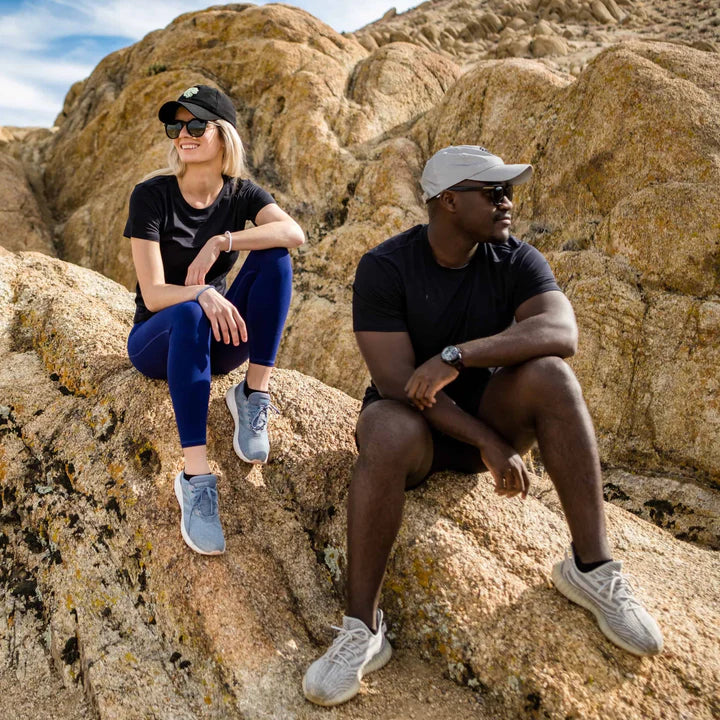Free U.S. Shipping On Orders Over $150

T-Shirt Fabric Guide: What's The Best Materials for T-Shirts?
Posted on
For many people, cotton is the go-to material when they are shopping for a good quality t-shirt. But a cotton t-shirt can, in some situations, be absolutely the worst choice. The best t-shirt material depends on what you plan to use the shirt for.
A hiking t-shirt has different requirements from a lounging t-shirt. So we’ve created this complete t-shirt fabric guide outlining the best materials for t-shirts.
What To Consider When Choosing T-Shirt Fabric
- How cool/breathable is it? This is especially important if you want a t-shirt you can comfortably wear outdoors in warm weather.
- Does it wick sweat? You want a fabric that absorbs sweat away from the skin, particularly if you tend to sweat a lot or plan to use the t-shirt for things like hiking, traveling or sports.
- Does it dry quickly? Some fabrics like cotton can absorb sweat well enough, but they then hold on to it for too long. If you expect significant sweating, look for a fabric that’s not only sweat-wicking but quick-drying as well. As a bonus, you can also wash and dry a quick-drying t-shirt in a few hours (handy when backpacking, camping or traveling)
Types of T-Shirt Fabrics
Here are the main types of fabrics used in t-shirts, including their pros and cons.
Cotton
Cotton is the most popular material used in t-shirts, and for good reasons. Cotton is fairly affordable, it is breathable and it does a good job absorbing sweat. Good quality cotton t-shirts also feel soft and comfy.
Not all cotton t-shirts are the same. Premium cotton t-shirts will feel supple and softer, while cheaper ones can feel a bit thin and scratchy. But generally, 100% cotton t-shirts are comfortable and versatile.
You can wear them at home, when around town and even to work.
Where cotton t-shirts struggle is in hot weather, during active activities like running and any situation where you sweat more than usual. Cotton absorbs sweat but holds on to it. It stays damp, which is not only uncomfortable but can actually be dangerous if it gets cold. The dampness increases the risk of hypothermia.
Polyester
Polyester t-shirts are the most popular budget option. Polyester is a synthetic material, which is why it’s cheaper than cotton.
One of the biggest advantages of poly t-shirts is their hard-wearing and durable nature. This makes them great as work shirts.
Polyester also dries quickly, making it ideal for situations where you expect to sweat a lot. That’s why many outdoor and activewear shirts contain polyester. Even when you sweat a lot or get rained on, they dry quickly.
On the downside, polyester is not very breathable or moisture-wicking. In hot weather, a polyester t-shirt can cause sweat to stick to your skin, making you clammy. A poly t-shirt can also make you overly hot.
Polyester also tends to smell sweatier than cotton and other natural fabrics.
Blended
Blended t-shirts contain a combination of two or more fabrics. The most common blended t-shirts are cotton-poly shirts. They combine the softness and breathability of cotton with the durability and fast-drying nature of polyester.
Activewear shirts typically contain a blend of several synthetic materials such as polyester, nylon and elastane (for stretchiness).
Merino Wool
Wool t-shirts are some of the best t-shirts you can get. They are extremely soft, they have excellent sweat-wicking capabilities, they dry quickly and they offer great temperature regulation. Wool also resists odors, ensuring you still smell fresh even when sweaty.
The best outdoor t-shirts for hiking and backpacking are made from merino wool.
You can also find cashmere wool shirts, but these are not ideal for outdoors as they are not as durable as merino wool.
The main downside of merino wool t-shirts is their price tag. They are more expensive than other fabrics.
Other Types of T-Shirt Fabrics
- Anti-bacterial fabric — used on self-cleaning and odor-resistant t-shirts like our very own HercShirt. You can wear the HercShirt several times without stinking.
- Bamboo — a common, though more expensive, alternative to cotton. Bamboo is soft, breathable and moisture-wicking. If you are on a budget, look for a bamboo-poly blended t-shirt.
- Hemp and linen shirts are also great picks if you are looking for a natural alternative to cotton t-shirts. Both are soft, breathable and moisture-wicking.
Final Thoughts
For everyday use and travel, a cotton or cotton-poly t-shirt is going to be fine. Wear bamboo, linen or hemp in warmer weather or if you expect some sweating.
For the gym, running and sports, we recommend a synthetic shirt that’s going to stay dry no matter how much you sweat.
If you plan to hit the hiking trails or go camping, pick synthetic (polyester or a synthetic blend) or spring for a merino wool shirt.
Antimicrobial shirts like the HercShirt are also great for outdoors and traveling. It keeps you smelling fresh and you can even wear it multiple times without washing it.
Quick links
Contact
6063 Hudson Road #160
Woodbury, MN 55125
Yo@hercLeon.com
Leave a comment: